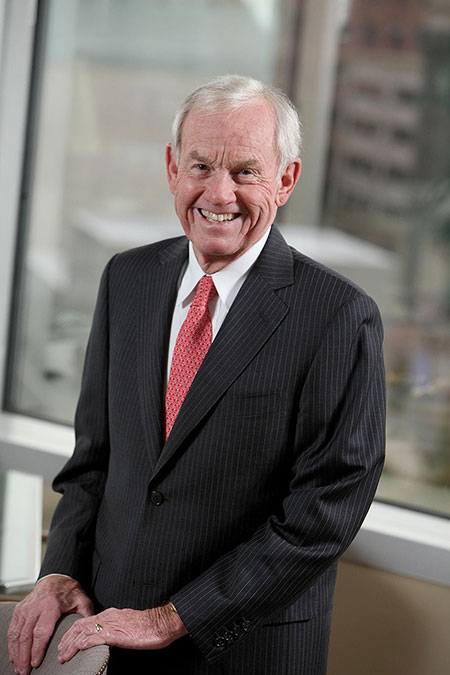Concept of courage needs to find pathway into a once proud nation
Articles
Sidebar
View more from News & Articles or Primerus Weekly
In 1956, a book was published that contained a volume of short biographies describing various acts of bravery and integrity by eight U.S. senators.
The book became a bestseller and won the Pulitzer Prize for Biography in 1957, and heralded the coming of a future U.S president in 1960.
The author, of course, was John F. Kennedy, although the book later was confirmed as a collaboration with his speechwriter, Ted Sorenson.
Regardless, the book profiles such senators as John Quincy Adams and Daniel Webster from Massachusetts and Sam Houston from Texas for defying “the opinions of their party and constituents to do what they felt was right and suffered severe criticism and losses in popularity because of their actions,” according to a promotional description of the bestseller.
If someone set out now to write a modern-day sequel, he or she would be hard-pressed to find few if any members of Congress worth profiling.
In marked contrast, earlier this month, in a special ceremony at the White House, a true American hero was saluted – albeit very belatedly – for his courage and valor during combat nearly 60 years ago in the Vietnam War.
His name is Col. Paris Davis, one of the first Black officers in the U.S. Army’s Special Forces unit, who received the Medal of Honor on March 3 for the multiple acts of courage and sacrifice he exhibited June 18, 1965 when he saved three of his fellow soldiers that had been wounded during a nighttime raid against a heavily armed Viet Cong camp.

The acts of heroism displayed by Col. Davis were recounted in vivid detail by President Biden during the White House ceremony that was attended by five other Medal of Honor recipients. Despite being wounded several times during the attack, including from a hand grenade explosion, Col. Davis refused to leave his comrades behind, sprinting back through heavy enemy fire to conduct three separate successful rescue missions. One of the soldiers had suffered a shattered kneecap from a sniper’s bullet, while another was knocked unconscious by a mortar blast. A third was shot in the head, seemingly left for dead until a miracle arrived in the form of Col. Davis.
When word was received of Col. Davis’s gallantry, he was immediately nominated for the Medal of Honor, the military’s highest award. Mysteriously, the Army somehow lost the paperwork related to his nomination – not just once, but twice – thereby delaying his national recognition for 58 years. Some suspect it was because of his race and the military’s troubled history of acknowledging the contributions made by men and women of color.
Whatever the case, the courage he displayed that fateful day was finally brought to light, earning the 83-year-old Virginia man the right to enjoy lasting praise from a grateful nation.
“Brave and big-hearted. Determined and devoted,” President Biden said of Col. Davis. “Selfless and steadfast. American.”
That final word, delivered in the context of a magnificent tribute to one of our nation’s greatest heroes, is descriptive of someone who places country above self, personifying a willingness to go above and beyond the call of duty while demonstrating an unwavering commitment to the common good.
Much like someone who is regarded by historians as perhaps our greatest president, Abraham Lincoln.
The 16th President of the United States was a wordsmith and diplomat who was credited with bringing an end to the curse of slavery and to forging a team that preserved a nation reeling from the impact of the Civil War.
Lincoln’s genius was principally his political shrewdness and devotion to duty coupled with an enormous capacity for empathy and moral courage. His place in history may have been stated best by Leo Tolstoy, one of the greatest authors of all time, when he wrote:
“His example is universal and will last thousands of years . . . He was bigger than his country – bigger than all the Presidents together . . . and as a great character, he will live as long as the world lives.”
Of similar fiber was another legendary political figure, Great Britain’s iconic war-time Prime Minister Winston Churchill, whose leadership took his country from the brink of defeat to eventual victory over the Nazi military machine.
Like Lincoln, Churchill set heroic standards of leadership through his mastery of the language, using words to inspire a nation to overcome the rise of totalitarianism.
“We will have no truce or parley with you, or the grisly gang who work your wicked will,” Churchill said as the world faced a fascist menace. “You do your worst and we will do our best.”
Churchill’s message is one for the ages, and helped motivate us to launch the Primerus Foundation in a non-partisan effort to improve the character and quality of our political leadership. Our mission comes at a critical time in our nation, which has been rocked in recent years by a political divisiveness that jeopardizes our most fundamental freedoms and liberties.
It is our aim to help change that narrative, working collaboratively with those of all political persuasions to forge a new national identity, this time by harnessing the enormous power of political unity.
Best regards,
Jack Buchanan, President